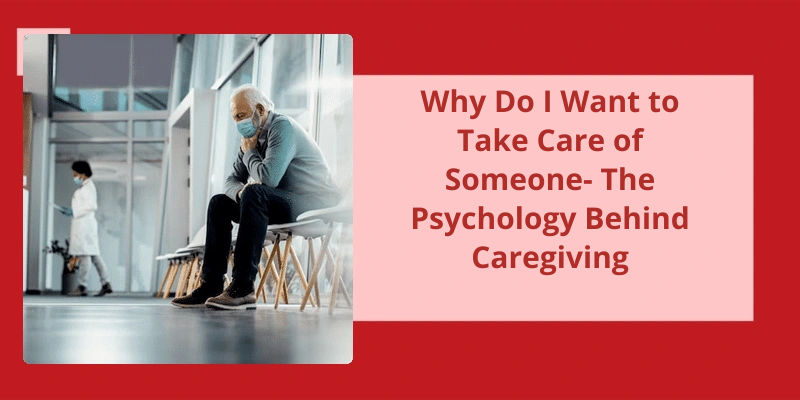Caring for someone is one of the most selfless acts one can undertake. It requires patience, understanding, empathy and a willingness to put someone else's needs before your own. The reasons why people choose to care for someone vary, but one of the primary motivations is the desire to help someone in need. For some people, it's a way to give back to a parent or relative who cared for them in their childhood. For others, it's a calling to work in a profession like nursing or social work, where they can make a positive impact on the lives of others. Whatever the reason, taking care of someone can be a deeply rewarding experience that strengthens bonds and builds lasting relationships. Furthermore, research shows that caring for others can be beneficial for the caregiver as well, leading to increased compassion and a stronger sense of connection to those around us.
What Does It Mean if You Want to Take Care of Someone?
Taking care of someone can mean different things depending on the context and relationship between the caregiver and the care receiver. For instance, parents take care of their children by providing them with food, shelter, and education. Similarly, caregiving can also involve taking care of sick or elderly individuals who need assistance with daily activities such as bathing, grooming, and dressing.
Caring for someone also involves nurturing the person emotionally and providing them with love and support. This can be especially important for individuals who’re going through a tough time, such as those experiencing a difficult physical or mental health condition. In these situations, the caregiver may need to offer empathy, encouragement, and a listening ear to help the person cope with their challenges.
This means understanding their preferences, desires, and opinions and working to meet those needs as much as possible. It also means being patient and compassionate, especially when the person is struggling or facing obstacles.
Taking care of someone can be both rewarding and challenging. It requires a great deal of empathy, patience, and dedication, as well as the ability to remain calm and composed during difficult situations. However, it can also be a fulfilling experience to know that you’re making a positive difference in another persons life.
It’s natural to want to help and take care of the important people in our lives. But sometimes, this can go too far and become a source of stress or burnout. In order to strike a healthy balance between caring for others and taking care of ourselves, it’s important to recognize the underlying motives behind our actions. By understanding why we feel the need to care for others, we can make more intentional choices about how we expend our time and energy.
Why Do I Try to Take Care of Others?
From a young age, we’re taught to be kind and considerate towards others, to put their needs before our own. This social conditioning can lead us to prioritize the happiness and wellbeing of those around us over our own. We feel a sense of responsibility for the people in our lives, and we want to do what we can to ensure that they’re happy and healthy.
At times, our desire to take care of others can come from a place of personal insecurity. We may have unrealistic expectations of ourselves, feeling guilty or selfish when we prioritize our own needs. Our self-worth becomes tied to our ability to care for others, and we may feel like failures when we aren’t able to meet our own standards.
Additionally, taking care of others can provide us with a sense of purpose and meaning. When we feel valued and appreciated for our caregiving efforts, it can give us a sense of importance and validation. We may derive a sense of identity or fulfillment from our role in the lives of those we care for.
However, it’s important to remember that prioritizing our own self-care is crucial for our own wellbeing. We can’t always be the ones to take care of others if we aren’t also taking care of ourselves. It’s essential to practice self-compassion and recognize that we’re only human – we can’t always be everything to everyone.
Exploring the Impact of Societal Expectations on Caregiving and the Pressure to Put Others First.
- Social pressure to prioritize the needs of others over one’s own
- Expectations from family and society to be a selfless caregiver
- The emotional toll of constantly putting others first
- The impact on mental and physical health
- Challenges in balancing caregiving responsibilities with personal and professional goals
- The need for support and resources for caregivers
Source: How come some people like taking care of others but …
Caring for someone in a romantic relationship goes beyond just saying “I love you.” It involves intentional actions that show support, concern, and empathy towards your partner. In this article, we’ll explore what it truly means to take care of someone in a relationship and how to foster a healthy, caring relationship with your significant other.
What Does It Mean to Take Care of Someone in a Relationship?
Taking care of someone in a relationship isn’t just limited to physical needs or emotional support during tough times. It involves a range of actions that reflect ones commitment towards their partners well-being, be it physical, emotional or mental. It means putting your partners needs before your own and working towards creating an environment that’s comforting, supportive, and affirming in every aspect.
Caring in a relationship means taking time out of your busy schedule to be there for your partner when they need you the most. It involves listening to them when they speak, showing empathy, and trying to understand their perspective. It means going out of your way to make sure that the other person feels loved, appreciated, and respected in the relationship.
In a healthy relationship, taking care of someone also involves practicing self-care. It’s essential to ensure that both partners are well-nourished, physically healthy and emotionally balanced. A healthy relationship requires both partners to be mindful of their own needs and taking steps to meet them. This not only helps the individual feel better, but it also helps create a more stable and supportive relationship.
Ways to Prioritize Self-Care in a Relationship
- Set boundaries and communicate your needs with your partner
- Make time for self-care activities such as exercise or meditation
- Practice self-awareness and reflect on your emotions and needs
- Seek support from friends, family, or a therapist
- Avoid sacrificing your own needs for the sake of the relationship
- Take breaks from technology and social media to connect with yourself and your partner
- Engage in hobbies and interests that bring you joy and fulfillment
- Learn to say “no” when necessary and prioritize your own well-being
When someone says they want to take care of you, it goes beyond just fulfilling your physical needs. It means that they’re committed to being there for you emotionally, and ensuring that you feel comfortable and supported. While financial support may not be possible, there are many other ways in which he can show his love and care for you. Let’s explore some of these ways in the following paragraphs.
What Does It Mean When Someone Says They Want to Take Care of You?
When someone says they want to take care of you, it signifies their interest in being a source of support and comfort in your life. They want to be there for you in times of need, to lend an ear when you need to talk, and to offer a helping hand whenever possible. This expression of care may be rooted in romantic or platonic feelings, but regardless of the nature of the relationship, it represents a deep sense of commitment and affection.
For some individuals, taking care of others comes naturally. They derive satisfaction and purpose from being able to help and support the people in their lives, and they view such caregiving as a fundamental aspect of their role in the world. These individuals often possess a high degree of empathy and emotional intelligence, which enables them to anticipate the needs of others and respond with compassion and kindness.
By offering to be there for you, they’re revealing their own emotional investment in the relationship and indicating their willingness to be emotionally available when you need them. This openness can be a powerful foundation for building deeper connections and fostering greater intimacy.
Of course, there can be negative connotations to the idea of being taken care of as well. In some cases, this language might be used to imply a power dynamic in which one person is expected to be subservient or dependent on the other. Such attitudes are harmful and antithetical to healthy relationships, and it’s important to be aware of any underlying issues that may be driving such language.
Ultimately, the desire to take care of another person can be a beautiful expression of care and compassion. It’s a gesture that can help foster deeper connections and build stronger relationships, and one that should be accepted with gratitude and appreciation. At the same time, it’s important to approach any such offers of care with a critical eye, and to be aware of any potential power dynamics or imbalances that might be present. With care and awareness, we can embrace the gift of being cared for, and offer care to others in return.
Different Ways in Which People Can Express Their Desire to Take Care of Someone, and How to Recognize and Respond to These Expressions.
- Show concern for their well-being
- Offer to help with tasks or errands
- Express willingness to listen and provide emotional support
- Make time for them and prioritize their needs
- Use compassionate and reassuring language
- Recognize non-verbal expressions of care, such as hugs or acts of service
- Respond with gratitude and appreciation for their caring gestures
- Communicate openly and honestly about your own needs and boundaries
When we say “take care,” the intention behind it goes beyond a simple goodbye. While it can certainly be said to acquaintances and coworkers, it’s often reserved for people we care deeply about. Some may wonder if “take care” is synonymous with “I love you,” and while the two phrases share similarities, they’ve distinct meanings and implications. Let’s explore the nuances of “take care” and what it conveys about our feelings towards others.
Does Take Care Mean I Love You?
Take care has become a ubiquitous phrase in modern-day society, propagated by social media influencers and loved ones alike. However, the meaning of this phrase remains elusive to some, with many questioning whether it conveys a genuine sentiment or a perfunctory farewell. In truth, take care can hold significant weight, especially in the context of romantic relationships and familial bonds.
Firstly, when someone tells you to take care, it’s an expression of their concern for your well-being. It means that they care deeply about your physical, mental and emotional health and want you to prioritize your self-care. The person saying this is acknowledging the difficulties you may face in their absence and is hoping that you stay safe and healthy.
Secondly, take care can hold a deeper emotional meaning. In some contexts, such as romantic relationships, take care can convey the sentiment of love and affection. When a partner tells you to take care, they might be saying, “I love you and I want you to be safe, happy, and healthy.”. This phrase can also serve as a reminder of the strong bond that exists between two people, emphasizing that even though they’re apart, the connection is still deeply felt.
Conclusion
It’s an act of compassion that not only benefits the recipient, but also enhances our own emotional well-being and capacity for empathy. Studies have shown that being a caregiver can strengthen existing relationships, creating a deeper sense of intimacy and connection. It’s a selfless act that requires patience, understanding, and a willingness to put the needs of another before our own. By taking care of someone, we not only provide practical support, but also demonstrate our love and commitment to those who matter most. In a world where many struggle to find genuine human connection, caring for others is a powerful way to build meaningful relationships that last a lifetime.






